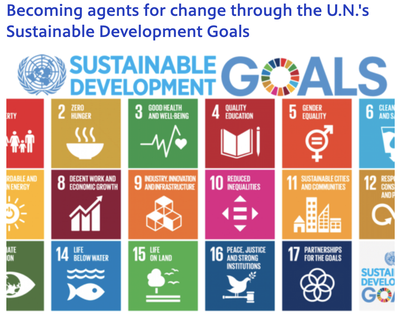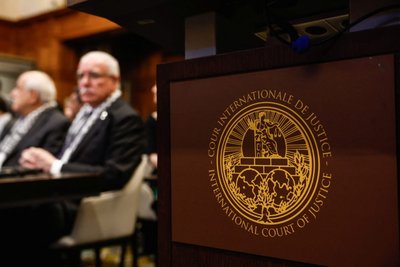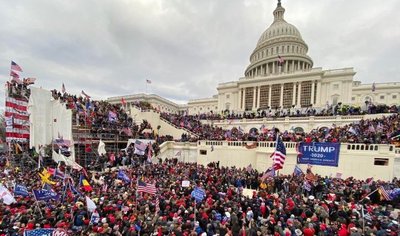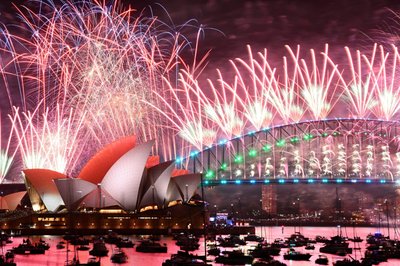Introduction
What is the United Nations (U.N.) and how does it function? The first part of the lesson will provide you with an introduction to this international system with a brief example of a Model U.N. debate on climate change.
You will then analyze and discuss an issue that the U.N. is currently debating. You will also examine the decision by the U.N.'s International Court of Justice (ICJ) on July 19, 2024, to declare Israel's occupation of Palestinian territories illegal and Israel's response.
Estimated time
One 50-minute class period
Grades
9-12
Objectives
- To learn what the U.N. is, when it was founded and what it does.
- To provide an introduction to international law and what powers the ICJ has.
- To analyze a current declaration by the U.N. regarding a current event.
- To better understand global affairs and the international system as a whole.
Warm-up activity (5 minutes)
What does the U.N. stand for? Jot down some ideas about what it is and what it does. Talk to the people around you and share your ideas with the class.
Watch this short U.N. explainer video:
Then, explore the U.N. website here and answer the questions below. (5 minutes)
- Why was the U.N. created?
- What is the Security Council?
- What is the International Court of Justice?
Main activity
Have you ever heard of Model UN? Maybe your school has a club? Now's your chance to learn more!
Divide the classroom into groups of 5 and assign each group one of the following countries:
- Australia
- India
- South Africa
- Venezuela
- Belarus
Spend 10 minutes with your team researching about your country.
- Where is your country located?
- Is your country big or small in size?
- What is the population?
- What is your country's nominal GDP (Gross Domestic Product) rank?
- What is your country's political structure? (democracy, not democracy, other)
- If your country is a democracy, does it currently lean left or right?
- Who are your country's closest allies?
Discussion (30-40 minutes)
Hold a discussion on the following question between all the countries:
What role should the international community take in addressing climate change, specifically in developing regions of the world?
All students in each group should participate in some way (speaking role for the opening statement, pointing out features on a map, reading quotes about the country, etc.).
Spend roughly 10 minutes researching your country's current position on climate change efforts. What will you advocate for? What will you be against?
TIP: Keep in mind your country's economic position. What energy resources does your country have? If you have a smaller country, should bigger countries help? If you're a bigger country, are you responsible for helping them? Why or why not?
Opening statements (5 minutes)
Have each student in their group give a 1-minute opening statement regarding goals they have for their country.
Then, have students take questions from representatives of the other countries. (For example, one country might ask Australia if they will help with global climate initiatives.)
Extension activity
Review:
- What is the U.N.?
- What is the ICJ?
The ICJ is the only international court that settles disputes between U.N. member states in efforts to prevent countries from resorting to conflict. The U.S. withdrew from the ICJ's compulsory jurisdiction in 1986 after the court ruled it owed Nicaragua war reparations. China, Iraq, Israel, Libya, Qatar and Yemen have not signed the declaration recognizing jurisdiction of the court.
While the ICJ cannot enforce its rulings, it may choose to bring the matter in front of the U.N. Security Council (Russia, U.S., France, China and United Kingdom) to take action.
Watch this quick 1-minute video on the ICJ:
Next, take a look at a case from July 19, 2024, that the ICJ ruled on regarding the Israel-Palestine conflict in which it declared Israel's occupation of Palestinian territories illegal and called for an immediate end to settlement and construction in both the West Bank and East Jerusalem as well as Israel Prime Minister Benjamin Netanyahu's reaction.
Watch this News Hour video on the ICJ's ruling regarding Palestinian territories.
The court cited Israel's actions of annexation and exerting permanent control over these lands in its decision. The ICJ also raised concerns regarding the implementation of discriminatory policies against Palestinians.
Israel strongly objected to the ruling with Israeli Prime Minister Benjamin Netanyahu, dismissing the ICJ’s decision as “false," saying, "The Jewish people are not occupiers in their own land... No absurd opinion in The Hague can deny this historical truth." Read more about Netanyahu's response here.
The court stated, "Israel has an obligation to bring an end to its presence in the occupied Palestinian territory as rapidly as possible."
Discuss as a class:
What are some arguments for and against the ICJ's decision and Israel's response? Take your time to reflect and write down your responses. The teacher may decide to have students share with the class or in smaller groups.
- What should the international community do to address starkly divided problems in the world?
- Do you think the U.N.'s rulings should be enforced? Is the U.N. powerless, if rulings cannot be enforced? Explain your responses.
Extension activity
Learn about the U.N.'s Sustainable Development Goals (SDGs) using this lesson:

Fill out this form to share your thoughts on Classroom’s resources.






